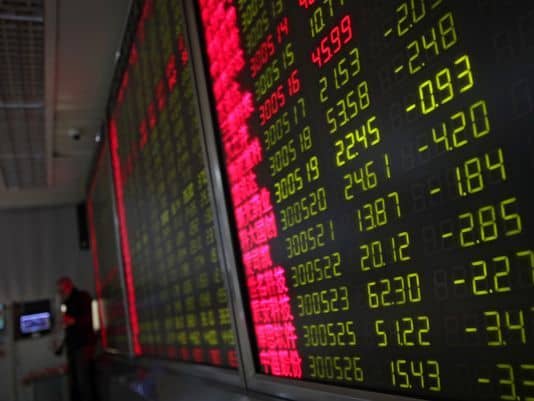
The Dow on Wednesday rebounded from a more than 500-point plunge to close 231 points higher in another rocky trading day, as Wall Street bet that tariff threats and tough talk on trade from China and the Trump administration was likely a negotiating tactic and that the sides would eventually reach a deal to avoid a trade war.
The Dow Jones industrial average, which was down 510 points at its low, finished the day up 230.94 points, or nearly 1%, at 24,264.
The wild price swings came after China struck back against the U.S. with threats to levy tariffs on more than 100 American-made goods ranging from autos to airplanes. Traders’ initial takeaway was that it signaled an escalation in the trade fight between the world’s two biggest economies.
But the stock market’s ability to mount a rebound was due in part to investors’ bet that neither country wants a full-out trade war despite the tit-for-tat tariff threats.
“I think the market is beginning to understand and remember that Trump’s bark is much bigger than his bite,” says Lindsey Bell, investment strategist at CFRA, a Wall Street research firm. “The trade implications between the U.S. and China are far from complete. Investors are hopeful that the final trade agreement will be much more lenient than what has been discussed in the last 12 hours.”
China on Wednesday targeted 106 U.S. goods for import tariffs — including important U.S. agriculture exports such as soybeans — after the Trump administration a day earlier released a list of 1,300 categories of Chinese goods the U.S. plans to impose tariffs on. Both countries are targeting $500 billion in goods.
Investors were aggressively selling stocks such as airplane maker Boeing and heavy-equipment maker Caterpillar. These large, global U.S. companies do a lot of business in China and overseas, which makes their sales and profits vulnerable if the two countries can’t work out a deal before the threatened tariffs, which are still under review, go into effect. Boeing (BA) closed 1% lower, after an early drop of more than 6%. Caterpillar (CAT) erased a 5% drop to finish 0.1% higher.
Paul Schatz, president of Heritage Capital, a money-management firm in Woodbridge, Conn., said the strong finish to the day for stocks would be viewed positively.
The big worry on Wall Street is that corporate profits and sales will be hurt if trade restrictions are put in place, which would be negative for stock prices. Analysts expect strong results from corporate America when companies start reporting quarterly results next week. Profit growth of more than 18% is expected for companies in the Standard & Poor’s 500 stock index, up from a forecast of around 12% at the start of the year, according to earnings tracker Thomson Reuters.
China’s targeting of U.S. farm states and the nation’s agriculture business is also cause for concern, says Will Rodger, director of policy communications for the American Farm Bureau Federation.
American soybean growers would be among the biggest losers if the White House proceeds with its proposed tariffs on China and China retaliates, Rodger said. Annual U.S. soybean exports to China total roughly $13 billion of the $20 billion in the nation’s total yearly agricultural sales to China, he noted.
Most investors agree that tariffs are bad for business and the economy.
“Tariffs and trade wars are just plain bad,” Schatz says. “I don’t care what the president tweets, no one wins.”
If there’s a silver lining it is that much of the “jawboning” is viewed as part of the negotiation process, he adds.
“The actual tariff process takes months before (anything) is enacted,” Schatz says. “There will likely be negotiation. For our economy’s sake, let’s hope that the adults come to the table in good faith from all sides.”
